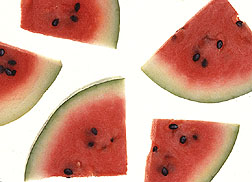This page has been archived and is being provided for reference purposes only. The page is no longer being updated, and therefore, links on the page may be invalid.
|
Read the magazine story to find out more. |
Watermelon Shows Its Lycopene StripesBy Rosalie Marion BlissJune 4, 2002 Watermelon growers aren’t exactly singing the new tune: “Our lycopene is better than your lycopene.” But there is a new twist on the amount of healthful lycopene found in raw watermelon versus raw tomato that’s heating up discussions. Besides sharing a pinkish-red color, watermelon and tomato are known sources of the phytochemical lycopene--one of a host of beneficial compounds found in plant foods. Phytochemicals have not yet been classified as traditional nutrients, such as the vitamins and minerals considered essential for life. Still, they’ve been found to reduce the risks of age-related diseases and many people call them phytonutrients. Agricultural Research Service scientists working to determine lycopene levels in varieties of watermelon have found many have as much as--or more than--that found in raw tomato. But lycopene content in food is different from bioavailability in humans. Bioavailability is how well the body digests, uses and stores a given chemical. ARS nutritionists Beverly A. Clevidence and Alison J. Edwards of the Phytonutrients Laboratory in Beltsville, Md., conducted a 19-week study with 23 volunteers to assess the bioavailability of lycopene from watermelon. Tomato traditionally has been used in lycopene research because of its established lycopene levels. Now here’s the rub: Past testing showed lycopene bioavailability to be low from ingesting raw tomato, yet higher from ingesting heat-processed products, such as tomato juices and sauces. Heating and homogenizing are known to increase tomato’s lycopene bioavailability. Researchers wondered whether raw watermelon would echo raw tomato’s low bioavailability. Would watermelon also need to be heat-treated to increase its available lycopene? It didn’t. That’s good news for people who don’t like tomatoes but do like watermelon. They can eat their watermelon and absorb their lycopene, too. Read more about watermelon’s lycopene punch in the June issue of Agricultural Research magazine. ARS is the U.S. Department of Agriculture’s chief scientific research agency. |

